

 There is light at the end of the tunnel. For years, Genesis fans had to make do without the special CDs and live recordings and other commodities with which bands like U2 and REM favoured their fans. None of that for Genesis fans – so far. After several failed attempts to utilize the internet the concept of having an official homepage that keeps the fans happy finally seems to come to fruition. The renewed closer contact to the fans is also evident in the first DVD released by the Genesis camp. Fine DVDs by Phil Collins have come into the shops recently, now Genesis follow.
There is light at the end of the tunnel. For years, Genesis fans had to make do without the special CDs and live recordings and other commodities with which bands like U2 and REM favoured their fans. None of that for Genesis fans – so far. After several failed attempts to utilize the internet the concept of having an official homepage that keeps the fans happy finally seems to come to fruition. The renewed closer contact to the fans is also evident in the first DVD released by the Genesis camp. Fine DVDs by Phil Collins have come into the shops recently, now Genesis follow.
Many of us have long wished for a kind of update for the A History video from 1991. Lots of things have happened since the days before We Can’t Dance, so a thing like that was much called for. In our hands we now hold the new Genesis biography film. The Genesis Songbook is available both as DVD and VHS videotape. The bonus material, however, makes the DVD much more interesting and worthwhile – another good reason for VHS junkies to move on to the DVD technology.
Let’s get some things out of the way. The title is terrible. The cover is even worse. Annoying. You’d be hard-pressed to find a foto on which Tony, Mike and Phil look more stupid than on this one. Besides, these three do not represent everything that can be found on the DVD. The title is probably the embarrassing result of the embarrassing fact that the band was apparently unable to find a proper title. Best regard both these things in order to avoid superfluous annoyance.
The story of the band is told at a terrific speed in approximately one hour’s time. Each period is accompanied by a selection of songs and competent commentaries from people who were involved or at least very familiar with it.
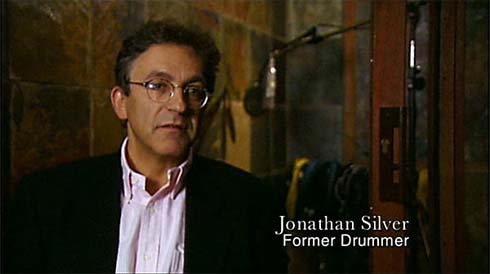 The main menu, however, is a delicious appetizer. You can make your choice to the new recording of Steve Hackett playing Horizons. The documentary opens with a recording from the band rehearsing for a concert in honour of Tony Smith last autumn. A highlight at the beginning, followed by a fast-forward discussion about what Genesis was about at any given time. Peter Gabriel and Tony Smith share their point of view, too.
The main menu, however, is a delicious appetizer. You can make your choice to the new recording of Steve Hackett playing Horizons. The documentary opens with a recording from the band rehearsing for a concert in honour of Tony Smith last autumn. A highlight at the beginning, followed by a fast-forward discussion about what Genesis was about at any given time. Peter Gabriel and Tony Smith share their point of view, too.
The documentary leaves out Jonathan King whose “It was me who discovered Genesis” attitude is probably (despite his role in the band history) as annoying to the band as it is to the fans. Once more we get to see the beginnings of Genesis, once again we are told that Phil was evidently a good drummer just by the way he sat on the stool for his audition, that he lightened the mood, that the band did not intend to be a live band and that Anthony Phillips leaving the band was a hard blow. Nothing new here, but it is documented lovingly, but perhaps a bit too briefly. A mini highlight is a brief comment by Genesis’ first drummer John Silver.
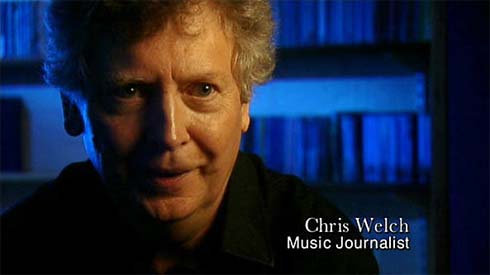
After that the surprises start rolling in. Chris Welch, a journalist and a Genesis fan, Armando Gallo, a household name with the fans, and indeed, Alan Hewitt make their appearance. An exciting mixture! One may argue about the value of their statements but it is very refreshing to hear “external Genesis insiders”, as it were. Steve Hackett talks about his first impression of Genesis. His large red sunglasses and black-and-white tie match the inferior cover design of the DVD. Then there are more long-known facts. At times one is pleased that things are not covered in every minute details, but then there are moments when one would wish for more or for a complete live song. Peter Gabriel makes us chuckle when he explains that Genesis were not interested to promote I Know What I Like on Top Of The Pops and similar shows. Then there is the total surprise of Ray Wilson (styled “musician”, not “former lead vocalist”) announcing that he admired the early Genesis. Peter’s departure from the band is covered rather briefly whereas the new beginning with Phil as the singer is discussed at length. Well, we really do not need to hear again that Tony does not like The Lamb too much and that Peter insisted on writing all the lyrics himself. So the next highlight is Genesis’ long-term producer David Hentschel who talks about the difficulties and peculiarities of Genesis’ recording sessions in the era after Gabriel.
Then there is possibly the biggest highlight: A new recording of Afterglow with Phil singing and Tony accompanying him on the e-piano (the full length version of the song is included in the DVD extras). The band mention that the lyrics became simpler and Alan Hewitt explains that Afterglow is their ultimate song. That’s a clear statement. Opinions may differ. The reasons for Steve’s departure are sketched by Steve and David Hentschel before Armando Gallo says the final words in the first volume of Genesis’ musical history.

Mike demonstrates how he improvised Follow You Follow Me and Chester Thompson states that the band were and still are top-level songwriters. Then on we hurry to Duke, where Daryl Stuermer explains that he admires the many changes in the band’s musical style. The development of Turn It On Again is demonstrated. Mike plays the guitar riff at the well-known fast and the original slow speed getting his finger in a knot round the guitar neck. Such moments make the DVD even more interesting.
Mama introduces the band’s next phase. It has to be criticized that Genesis’ most disputed album Abacab had been plain ignored on this DVD. We find out instead that Mama was influenced by rap music, which is Hugh Padgham’s fault because he brought a record by Grandmaster Flash to the studio. The song leads us into Genesis’ most successful period and the band have a ball discussing the ensuing albums. Chester points out that Genesis turned from a fan-based band to a global event which takes away something from their high standard. Tony recognizes that, though the band never abandoned long songs, they will probably be remembered for their singles. He certainly is right as far as the Collins era is concerned! All of them speak against the commercial image. Wafts of nostalgia drift through the film material when it comes to We Can’t Dance. Daryl Stuermer regrets that the band did not tour again in the Tony-Mike-Chester-Phil-Daryl combination. After that there really is a look at the time around Calling All Stations. It was not at all unlikely that that period would be left off the DVD. The new attempt and the alleged failure of post-Collins Genesis are reported in an entertaining, not all depressed way. Ray regrets the outcome, so does Tony Smith. Tony Banks fears they were having to compete with the pop bands of the time. All in all there is a feeling that all options for the future are open. Tony Smith states it perfectly: Once the good material is there, the rest will work out alright. Chester Thompson says he was impressed they were a real band. He adds that he had never seen a band in which everybody really had the same rights. Alan Hewitt ties it down to one short sentence: “They were perfect – It’s as simple as that.”
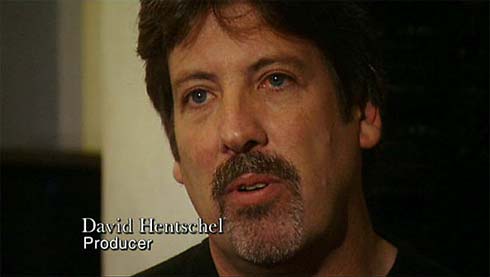
The DVD includes some 40 minutes of bonus material:
1. Phil Collins Joins Genesis
It’s the famous pool story after Phil recounts the end of his time with Flaming Youth and explains that Ronnie Caryl also auditioned for Genesis. Mike points out again that Phil brought a relaxed element into the band.
2. Steve Hackett Joins Genesis
Nothing new here either. Steve mentions the advertisement and the peculiarity of the band. He still seems surprised that he made it into the band so easily.
3. Horizons
Steve plays this classic number live in a new version on the acoustic guitar – more of that, please!
4. Writing
Supper's Ready
Supper’s Ready in the 70s was what Mama was for the 80s. The development of this huge classic is described. Tony explains that the song really grew around Willow Farm and that the quality of the finale stems mainly from Apocalypse in 9/8. He plays some of the melodies on the piano, slowly adding new elements which makes the complex music really comprehensible – even to people who do not play an instrument.
5. The Lamb Lies Down On Broadway
Everybody sees critical, extravagant and outstanding things in The Lamb. The idea was to extend the concept of Supper’s Ready to a whole album. It turned out to be a double album and Phil is still surprised how the band could go and perform the album live in a country where it had not even been released on record yet. Gabriel’s departure is mentioned, as is the cancelled final show.
6. Firth of Fifth
An opportunity for Tony to dissect his favourite song. He plays the middle part on the piano, hitting some bum notes (like Mike Rutherford on Turn It On Again), but he just laughs it off. It seems remarkable that this scene was not re-shot. Tony points out that, though it is his own song, it could not have become what it is without Genesis.
7. Bill Bruford Joins Genesis
First of all, he never joined Genesis. Bill Bruford and Phil Collins explain how Bill ended up drumming for Genesis and how he disappeared again. No new details here.
8. Chester Thompson & Daryl Stuermer join Genesis
Both gentlemen became semi-members of the band after they had played live with them for many years, but never on a studio album. Chester tells how Alphonso Johnson of Weather Report played him some Genesis. He also explains that Phil, apparently impressed by his work on Frank Zappa’s albums Roxy and Elsewhere, asked him if he would like to drum for Genesis. Chester’s slang (“Man, that’s bad”, meaning, “Wow, that’s brilliant”) confused the band to the point that they feared he’d leave during the first tour. Genesis was a whole new experience for Chester and that was an added bonus on the job. Daryl, on the other hand, had heard Collins-era Genesis. He was invited for an audition by Mike Rutherford. Daryl also knew Chester Thompson and knew that he had joined the band as a tour drummer the year before. That’s why he felt comfortable with the job.
9. Follow You Follow Me
This pop classic is re-recorded in semi-acoustic fashion. The song feels different from the unplugged version with Ray Wilson. That’s obviously mainly because it’s Phil singing. A fine new version of the song.
10.
Afterglow
The absolute highlight of the DVD in full length and glory. Alas, Phil cannot sing the high notes anymore or does not dare sing them. Still, the song sends tears to one’s eyes and shivers down one’s spine. Before they play it, the meaning of the song is explained.
11.
No Son Of Mine
Another semi-acoustic version. It’s only the first half, though. After that Jim Yukich talks about the video shoot, just as on Land of Confusion on the main part of the DVD. Then we see the end of the video and reach the end of the DVD…
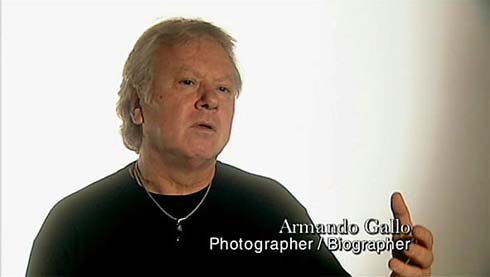
A hundred minutes worth of entertainment, details, well-known stories and big surprises. Real Genesis fan(atic)s may not consider this a top-notch item, but all in all The Genesis Songbook gives off the impression that the band really produced something for their fans. Casual Genesis fans will gain a good overview of the band’s history. Critical omissions are Abacab and the re-recording of The Carpet Crawlers.
Perhaps we will see more of that and other interesting snippets on the next couple of planned DVDs. Wait and see.
So, what did we learn from all this? Alan Hewitt bought Invisible Touch, listened to it once and played frisbee with it. Turn it on again!
by Christian Gerhardts
translated by Martin Klinkhardt

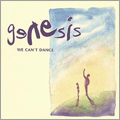


Rerelease of the 1991 Hit-Album with new Stereo Mixes.
Review available